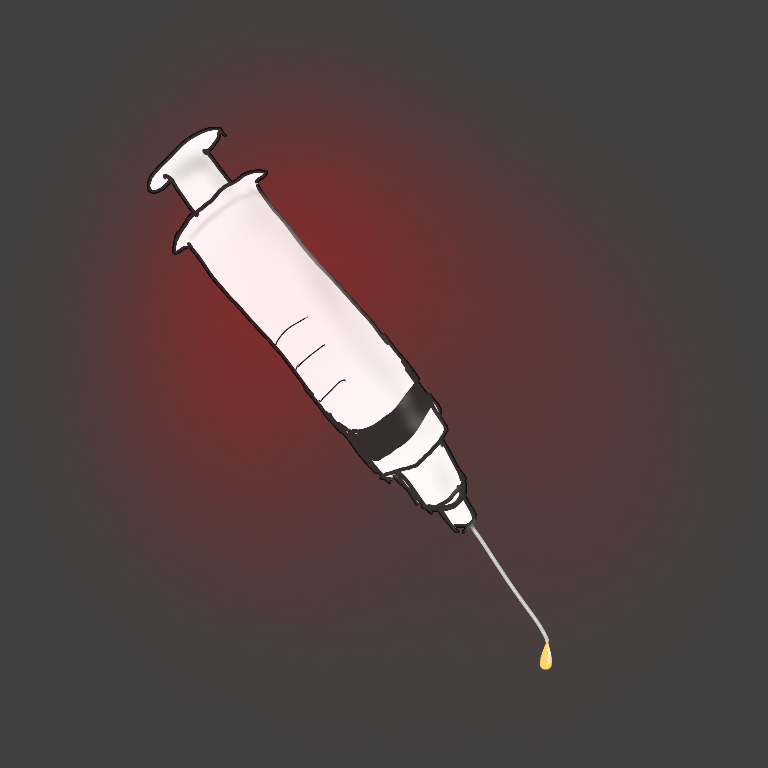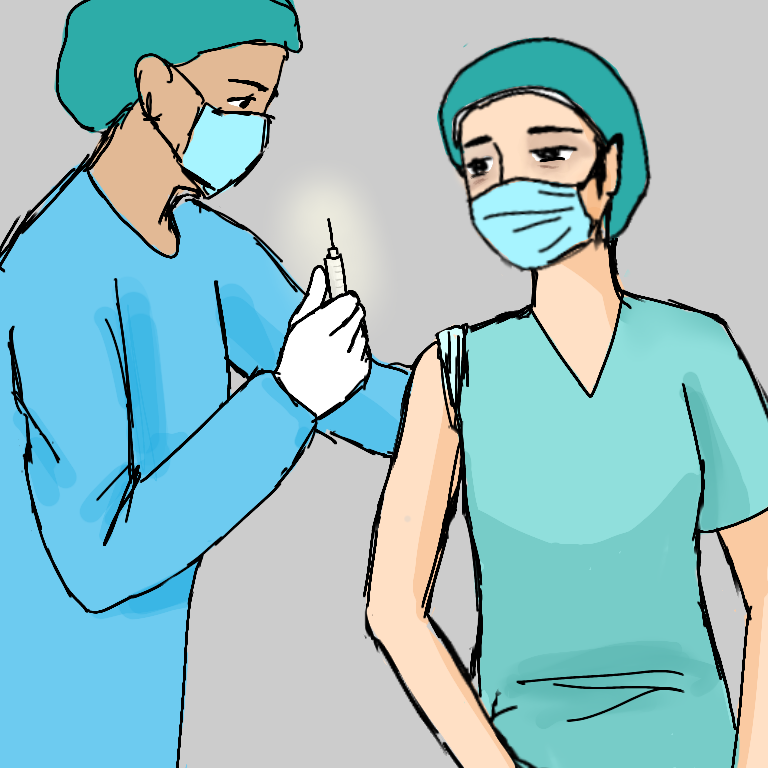B&G: Should people keep taking the COVID-19 vaccine?
February 3, 2021
As governments race forward with their COVID-19 vaccine distribution plans, many still remain wary about whether or not they should step in line. With their quick turnarounds, much is still not known about the vaccines, however, some experts say they are perfectly safe to take. People must now decide between embracing their fear or helping to beat back the pandemic. Read both perspectives below.
Don’t rush in, the COVID-19 vaccine could create a new health crisis
The future and the integrity of measles and the measles vaccine respectively, is currently being threatened.
After more than two million people around the world have died from COVID-19, everyone is desperate to get in line for the vaccine. As the U.S. and other countries begin the process of mass immunizations, citizens hope for a return to normalcy from this deadly virus. However, the distribution of a newly produced drug is not something to be taken lightly considering the uncertainty of long term side effects and the rushed nature of its development. Despite the horrors of the pandemic, administering the vaccine so soon after its creation is a dangerous gamble.
Companies have released important information about the short-term side effects experienced by those who partook in the multitude of clinical trials for the vaccines. According to NBC Washington, participants of Moderna and Pfizer’s September COVID-19 vaccine trials reported experiencing high fever, body aches, bad headaches, daylong exhaustion and other symptoms after receiving the shots. Both companies acknowledged that their vaccines could induce side effects that are similar to symptoms associated with mild COVID-19, such as muscle pain, chills and headaches.
Both the Moderna and Pfizer vaccines function by delivering mRNA to cells in the body, priming the immune system to recognize and attack the virus–a procedure untried in the scientific world. Tal Brosh, head of the Infectious Disease Unit at Samson Assuta Ashdod Hospital, acknowledged that there are unknown risks to this kind of vaccine. Among the possibilities are local and systemic inflammatory responses that could result in autoimmune disorders. U.S. history teacher Lisa MacFarlane said, “It’s a little concerning. I would definitely want to read more about that before I get the vaccine.”
Furthermore, many debate the effectiveness of the vaccine. Michal Linial, a professor of biological chemistry at the Hebrew University of Jerusalem, theorizes the vaccine’s mRNA method could fail, lulling people into a false sense of immunity. Even if the mRNA successfully enters the membrane, the vaccine’s long-term efficacy remains in question. Not only will more people die due to the vaccine’s unreliability, but countries will be forced to execute a costly additional round of vaccinations.
As more vaccines are administered, the number of unexpected side effects and allergic reactions have been steadily increasing. According to WCVB, six life-threatening allergic reactions to the Pfizer vaccine have been reported after its distribution, such as anaphylaxis and hives. If vaccines continue to be administered without a proper understanding of their allergic implications, they will be working against their intentions.
Even though these trials have revealed a plethora of short term effects, they fail to provide any information on long term effects. These effects may emerge only after a large percent of the population has already taken the vaccine. This means that millions of people could end up with severe illnesses in a couple of years, and humanity would find itself in another health crisis. Even though scientists have said that they plan to keep an eye out for dangerous or unexpected long term effects, they continue to make the public helpless guinea pigs in a massive experiment that could cost us our lives.
One extreme incident that generated concern was that of an anonymous participant in one of the clinical trials of the vaccine. This participant suffered from spinal cord damage due to inflammation caused by the vaccine, resulting in British regulators pausing testing. The company conducting the trial, AstraZeneca, attempted to conceal details about this terrifying incident, leaving many to question whether they can trust these pharmaceutical companies when they are not fully transparent. The fear of another life-altering accident could happen again is shared by many. Sophomore Juan Amaya said, “It really just scares me. I feel bad for the person who participated and thought that they were finally getting a cure but now has to suffer great consequences.”
We are living through trying and unprecedented times, and have been presented with a new scientific discovery shrouded in controversy and confusion. Though it has the potential to save millions, this new vaccine could also harm just as many lives through drastic and unforeseen consequences. We must take careful steps to ensure our health, thus the general population should refrain from scrambling to get vaccinated until there is enough information to make a well-informed decision. A massive number of people throughout the world have already been sickened by this pandemic, we should not put millions of healthy people at risk because of our desperation.
Quiet down anti-vaxxers, the COVID-19 vaccine is perfectly safe
Over 107,000 Montgomery County residents have received their first vaccine dose and approximately 34,000 residents have been fully vaccinated.
As the COVID-19 virus continues to encroach on and disturb people’s lives, many look fervently to the recent vaccines as the only means to save them and return the world to a state of normalcy. Despite the abundance of misinformation on vaccinations, research has repeatedly proven that vaccines are safe, and the COVID-19 vaccines are no different. With multiple pharmaceutical companies already having conducted trials and distributing their vaccines, arguments against inoculation hold no weight.
At the moment, two vaccines have been authorized in the United States, the Pfizer-BioNTech and Moderna COVID-19 vaccines, with AstraZeneca’s being distributed in other parts of the world. A common misconception about these vaccines, reinforced by the poorly named Operation Warp Speed (OWS), is that they have not been thoroughly tested. According to the Department of Health and Human Services, OWS helped speed up the development and distribution of vaccines by providing government support in their production. Focusing on safety and effectiveness throughout the process, OWS cut no corners.
Science teacher Eleanor Parks said, “The most that I do know about it is that all the protocols were followed, they were just expedited. So I am confident in the science behind the vaccines, that they did go through all the necessary trials and protocols.” As more people have the opportunity to get the vaccine, misinformation about it must not spread, so people are not hesitant to receive it.
Over the past year, many infectious disease experts have discussed the need for herd immunity against COVID-19, which is when enough of a population is immune to an infectious disease that it can no longer spread. According to The Atlantic, to achieve herd immunity roughly two-thirds of the population would need to be vaccinated. A poll conducted by Pew Research Center in November 2020 reported 60 percent of Americans would definitely or probably get a vaccine for COVID-19 if one was available today, up from the 51 percent in September 2020. Americans are becoming more willing to get the vaccine as more information is available, and eventually, there will be a sufficient amount to achieve herd immunity in the country.
While any COVID-19 vaccine approved by the Food and Drug Administration is safe, there are still side-effects to consider. According to the Center for Disease Control (CDC), some common side effects are swelling, fever, chills, headache and tiredness. However, these are common in other established vaccines, such as the flu vaccine. They are signs the body is building protection and they go away within a few days.
Park said, “one of my biggest concerns is that people will say like ‘oh the vaccine is out I can stop socially distancing, I can stop wearing a mask.’ This isn’t going to be like an on-off switch […] it will take time for us to see the overall benefits of mass vaccinations.” While the availability of vaccines will be a relief, people must still take precautions of wearing masks and social distancing. Vaccines are a valuable tool in the fight against COVID-19, but they will only be effective if we can keep up our current social distancing measures.
The age-old argument against vaccinations, which is being applied to the COVID-19 one, is that the injections can cause autism in young children. Though, according to the CDC, there is no link between vaccines and autism. A 2011 analysis by the Institute of Medicine used peer-reviewed literature to review influenza, hepatitis A and B, HPV and meningococcal vaccines as well as those containing diphtheria-toxoid, tetanus toxoid and acellular pertussis found that “these vaccines are safe and that serious adverse events are quite rare.” Research has repeatedly proven that the benefits of vaccines outweigh the risks, many of which are exaggerated or entirely made up by the anti-vaxxer movement.
At the end of the day, the COVID-19 vaccines are everything people have been hoping for–the possibility of normalcy. However, the efficiency of a vaccine depends on individuals stepping up and volunteering for the safety of everyone. History has proven that the only way to fully move past viral crises is to vaccinate the population. If older generations inoculated themselves from polio and measles, we must do the same and move forward.

